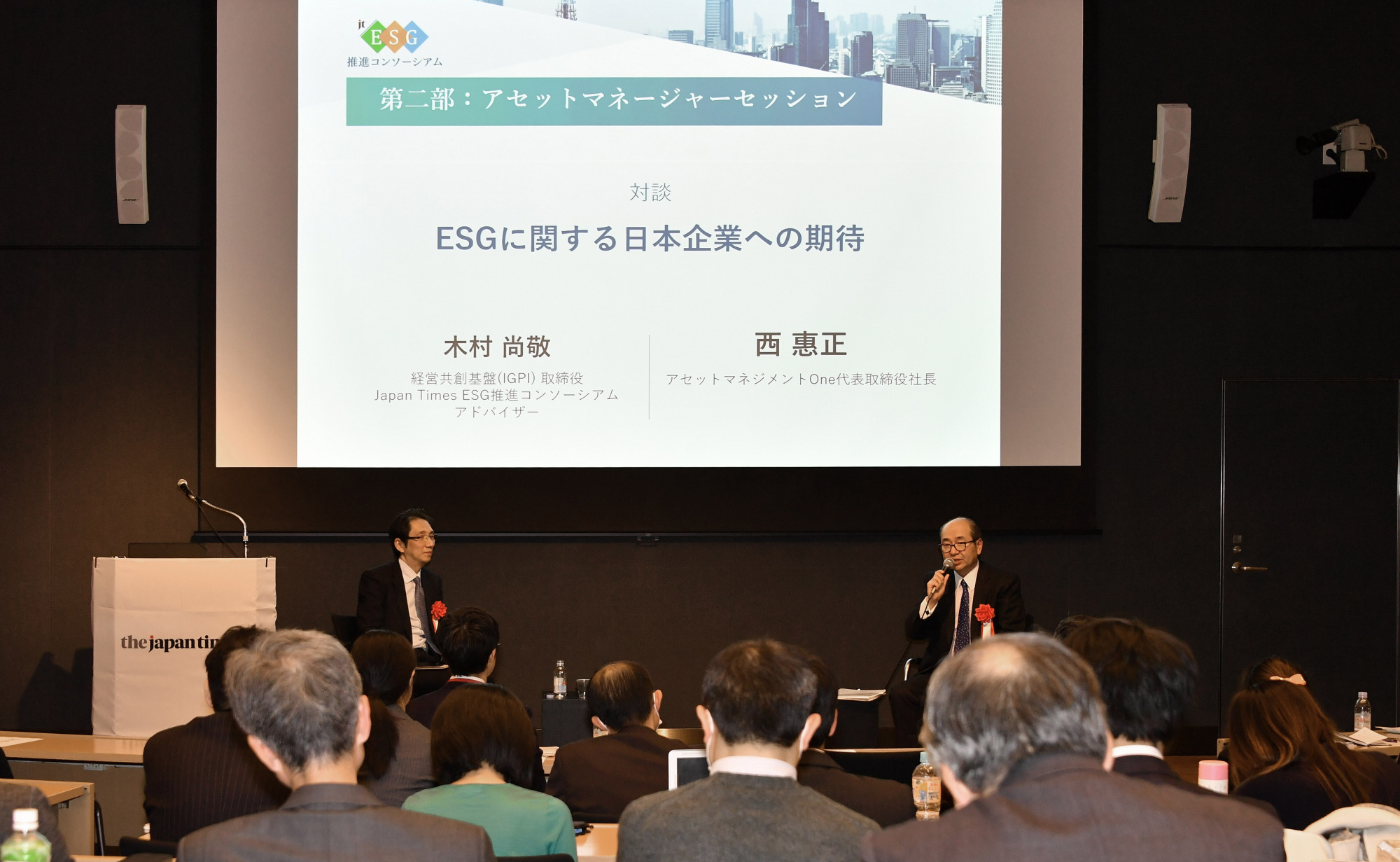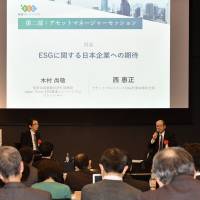Commitment from top management is indispensable for promoting ESG (environmental, social and governance) engagement, Yasumasa Nishi, then-president and CEO of Asset Management One Co., stressed at a recent forum in Tokyo. He also noted management needs to craft a long-term business strategy in consideration of various stakeholders to pursue their sustainability.
Nishi, who has managed portfolios in the banking sector for over 25 years before assuming the firm's presidency, said that involvement of a company's top management differentiates between whether the company is serious about ESG affairs or not.
"A materiality of what a company plans to work on comes up in addressing ESG matters, as its management needs to determine their focus, clarifying risk and return," he pointed out.
Nishi was invited to a dialogue session on expectations for Japanese firms in relation to ESG that took place during a forum organized by The Japan Times on March 12, marking the launch of the ESG Consortium to promote Japanese firms' commitment on this front. Naonori Kimura, partner and managing director at Industrial Growth Platform, Inc., facilitated.
Necessity to engage in ESG activities has become a global agenda since the world realized that things won't work well under current capitalism alone, Nishi explained.
He noted that countries and companies have to address issues, including those surrounding nuclear power generation and gun control, while environmental concerns have prompted relevant parties to act for their sustainability.
Unlike the 20th century, mass production and mass consumption won't work in the coming years, as they would inflict too much damage on the environment, Nishi said.
"Production activity at the moment is not supposed to add extra prices on unlimited resources, while the price of a product utilizing limited sources inevitably goes up," he explained, adding that the cost necessary to curb environmental damage has not been added to the values of social activities.
"If it turns out that finite assets are no longer used, companies making use of them wouldn't survive," Nishi said. "Such assets are called stranded assets in ESG terminology."
As stranding occurs immediately, from a long-term perspective, business activities need to recognize its signs ahead of time and take necessary measures, Nishi warned.
"An environmental issue could pose risks for companies in the future, so management has to take measures in advance," Nishi said. "It would involve a significant cost, so they need to change direction."
Nishi stressed that the management should think about commitments for the future in addition to the benefits of their employees, shareholders and overall society.
Kimura pointed out that companies tend to see their ESG commitments as costly engagements, but they need to view the efforts from a more strategic perspective.
To further accelerate ESG commitment, Nishi stressed it's essential for each company, including asset management firms, to publicly announce their engagement.
One recent example that surprised Nishi was the announcement released by New York-based BlackRock, Inc., the world's largest asset manager. The company posted questions to firearm manufacturers and distributors regarding their policies and practices on its website in March, following a Florida high school shooting where 17 were killed.
"Asset management companies usually do not disclose such things, as they keep a distance from activists," Nishi said. "But this disclosure showed how much the company made a commitment as an asset management firm.
"ESG matters require everybody's involvement, so we need to look in the same direction," he noted. "The biggest and best way to do that is for each corporation to raise their voices against certain issues."
Additionally, Nishi stressed that Japanese companies need to send out information in English if they would like to have a wider impact. He said that the traditional "what is done by night appears by day" notion that prevailed in Japan does not work well in a global community.
Kimura agreed with him, citing his recent conversation with people in the financial sector in Singapore, who said that Japanese firms lack information transmission.
This series highlights ESG (environmental, social and governance) activities of companies and other organizations.



















With your current subscription plan you can comment on stories. However, before writing your first comment, please create a display name in the Profile section of your subscriber account page.